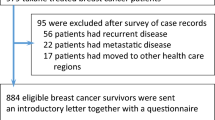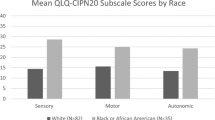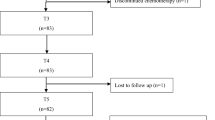Abstract
Purpose
To elucidate whether adjuvant taxane monotherapy is a feasible and tolerable for postoperative breast cancer patients, we evaluated the severity of chemotherapy-induced peripheral neuropathy (CIPN) and the relative tolerability of regimens by health-related quality of life (HRQOL) assessment in node-positive breast cancer patients treated with taxane-containing regimens.
Methods
We evaluated CIPN and HRQOL in the first 300 patients enrolled in a larger (1,060 total) multicenter phase III trial randomized to one of four adjuvant regimens: (1) anthracycline–cyclophosphamide followed by paclitaxel (ACP), (2) AC followed by docetaxel (ACD), (3) paclitaxel alone (PTX), or (4) docetaxel alone (DTX). CIPN was assessed by the Patient Neurotoxicity Questionnaire (PNQ) and the National Cancer Institute Common Toxicity Criteria, and HRQOL by Functional Assessment of Cancer Therapy-General (FACT-G). CIPN and HRQOL scores were compared between ACP and ACD vs. PTX and DTX, and ACP and PTX vs. ACD and DTX.
Results
PNQ sensory scores were significantly higher in patients treated with taxane monotherapy compared to treatment with AC followed by taxane (P = .003). No significant differences in PNQ sensory scores were observed between the ACP and PTX vs. ACD and DTX regimens (P = .669). Regardless of taxane regimen, PNQ severity scores for CIPN appear to be largely reversible within 1 year of adjuvant treatment. No significant difference in FACT-G scores was observed between any regimens during the study treatments.
Conclusions
Patient-reported CIPN was significantly more severe with single-agent adjuvant taxane compared to AC followed by taxane treatment; however, the HRQOL findings support that single-agent taxane treatment is tolerable.



Similar content being viewed by others
References
Ferguson T, Wilcken N, Vagg R, Ghersi D, Nowak AK (2007) Taxanes for adjuvant treatment of early breast cancer. Cochrane Database Syst Rev 4:CD004421
Sparano JA, Wang M, Martino S et al (2008) Weekly paclitaxel in the adjuvant treatment of breast cancer. N Engl J Med 358:1663–1671
Shan K, Lincoff AM, Young JB (1996) Anthracycline-induced cardiotoxicity. Ann Intern Med 125:47–58
Winer EP, Berry DA, Woolf S et al (2004) Failure of higher-dose paclitaxel to improve outcome in patients with metastatic breast cancer: cancer and leukemia group B trial 9342. J Clin Oncol 22:2061–2068
Rowinsky EK, Donehower RC (1995) Paclitaxel (taxol). N Engl J Med 332:1004–1014
Hilkens PH, ven den Bent MJ (1997) Chemotherapy-induced peripheral neuropathy. J Peripher Nerv Syst 2:350–361
Lee JJ, Swain SM (2006) Peripheral neuropathy induced by microtubule-stabilizing agents. J Clin Oncol 24:1633–1642
Argyriou AA, Koltzenburg M, Polychronopoulos P, Papapetropoulos S, Kalofonos HP (2008) Peripheral nerve damage associated with administration of taxanes in patients with cancer. Crit Rev Oncol Hematol 66:218–228
Wolf S, Barton D, Kottschade L, Grothey A, Loprinzi C (2008) Chemotherapy-induced peripheral neuropathy: prevention and treatment strategies. Eur J Cancer 44:1507–1515
Harvey V, Mouridsen H, Semiglazov V et al (2006) Phase III trial comparing three doses of docetaxel for second-line treatment of advanced breast cancer. J Clin Oncol 24:4963–4970
Litwin MS, Lubeck DP, Henning JM, Carroll PR (1998) Differences in urologist and patient assessments of health related quality of life in men with prostate cancer: results of the CaPSURE database. J Urol 159:1988–1992
Fromme EK, Eilers KM, Mori M, Hsieh YC, Beer TM (2004) How accurate is clinician reporting of chemotherapy adverse effects? A comparison with patient-reported symptoms from the Quality-of-Life Questionnaire C30. J Clin Oncol 22:3485–3490
Basch E, Iasonos A, McDonough T et al (2006) Patient versus clinician symptom reporting using the National Cancer Institute Common Terminology Criteria for Adverse Events: results of a questionnaire-based study. Lancet Oncol 7:903–909
Petersen MA, Larsen H, Pedersen L, Sonne N, Groenvold M (2006) Assessing health-related quality of life in palliative care: comparing patient and physician assessments. Eur J Cancer 42:1159–1166
Postma TJ, Heimans JJ, Muller MJ, Ossenkoppele GJ, Vermorken JB, Aaronson NK (1998) Pitfalls in grading severity of chemotherapy-induced peripheral neuropathy. Ann Oncol 9:739–744
Postma TJ, Heimans JJ (2000) Grading of chemotherapy-induced peripheral neuropathy. Ann Oncol 11:509–513
Hausheer FH, Schilsky RL, Bain S, Berghorn EJ, Lieberman F (2006) Diagnosis, management, and evaluation of chemotherapy-induced peripheral neuropathy. Semin Oncol 33:15–49
Sloan JA, Berk L, Roscoe J et al (2007) Integrating patient-reported outcomes into cancer symptom management clinical trials supported by the National Cancer Institute-sponsored clinical trials networks. J Clin Oncol 25:5070–5077
Kuroi K, Shimozuma K, Ohashi Y et al (2009) Prospective assessment of chemotherapy-induced peripheral neuropathy due to weekly paclitaxel in patients with advanced or metastatic breast cancer (CSP-HOR 02 study). Support Care Cancer 17:1071–1080
Kuroi K, Shimozuma K, Ohashi Y et al (2008) A questionnaire survey of physicians' perspectives regarding the assessment of chemotherapy-induced peripheral neuropathy in patients with breast cancer. Jpn J Clin Oncol 38:748–754
Shimozuma K, Ohashi Y, Takeuchi A et al (2009) Feasibility and validity of the Patient Neurotoxicity Questionnaire during taxane chemotherapy in a phase III randomized trial in patients with breast cancer: N-SAS BC 02. Support Care Cancer 17(12):1483–1491
Cella DF, Tulsky DS, Gray G et al (1993) The Functional Assessment of Cancer Therapy scale: development and validation of the general measure. J Clin Oncol 11:570–579
Fumimoto H, Kobayashi K, Chang CH et al (2001) Cross-cultural validation of an international questionnaire, the General Measure of the Functional Assessment of Cancer Therapy scale (FACT-G), for Japanese. Qual Life Res 10:701–709
Calhoun EA, Welshman EE, Chang CH et al (2003) Psychometric evaluation of the Functional Assessment of Cancer Therapy/Gynecologic Oncology Group-Neurotoxicity (Fact/GOG-Ntx) questionnaire for patients receiving systemic chemotherapy. Int J Gynecol Cancer 13:741–748
Huang HQ, Brady MF, Cella D, Fleming G (2007) Validation and reduction of FACT/GOG-Ntx subscale for platinum/paclitaxel-induced neurologic symptoms: a gynecologic oncology group study. Int J Gynecol Cancer 17:387–393
Ohsumi S, Sunada Y (2004) Techniques for the neurological examination of taxane-induced neuropathy. Breast Cancer 11:86–91
Jones SE, Erban J, Overmoyer B et al (2005) Randomized phase III study of docetaxel compared with paclitaxel in metastatic breast cancer. J Clin Oncol 23:5542–5551
Acknowledgments
We thank all the patients, investigators, and clinical research specialists who participated in this study. We also thank Ms. Michiko Kato and Ms. Yumiko Nomura for their helpful assistance in creating this study report.
Conflict of interest
This study was funded by the Comprehensive Support Project for Oncology Research (CSPOR) and for Health Outcomes Research (CSP-HOR) of the Public Health Research Foundation (PHRF; Tokyo, Japan). All corporate and personal sources of financial support to PHRF are listed in the CSPOR website (http://www.csp.or.jp/cspor/kyousan.html). The pharmaceutical manufacturers/distributors who had provided financial contribution as a corporate sponsor took no part in this study other than providing information relevant to proper use of the study drugs. All decisions concerning the planning, implementation, and publication of this study were made by the executive committee of this study. I certify that I have no conflict of interest relevant to this manuscript.
Author information
Authors and Affiliations
Corresponding author
Additional information
This study was presented in part at the 27th San Antonio Breast Cancer Symposium, Dec. 8–11, 2004, San Antonio and the 42nd Annual Meeting of the American Society of Clinical Oncology, June 2–6, 2006, Atlanta.
Rights and permissions
About this article
Cite this article
Shimozuma, K., Ohashi, Y., Takeuchi, A. et al. Taxane-induced peripheral neuropathy and health-related quality of life in postoperative breast cancer patients undergoing adjuvant chemotherapy: N-SAS BC 02, a randomized clinical trial. Support Care Cancer 20, 3355–3364 (2012). https://doi.org/10.1007/s00520-012-1492-x
Received:
Accepted:
Published:
Issue Date:
DOI: https://doi.org/10.1007/s00520-012-1492-x




